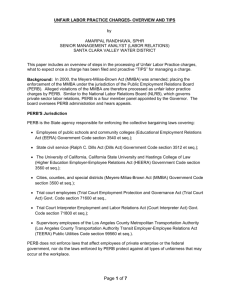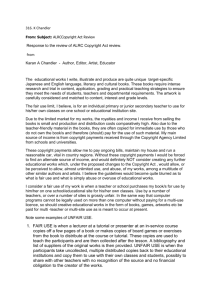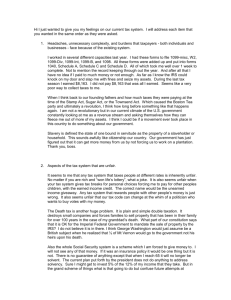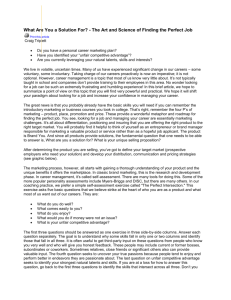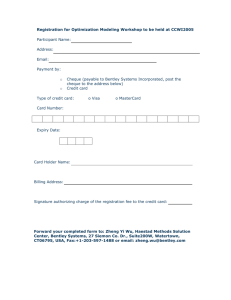Unfair Labor Practices
advertisement
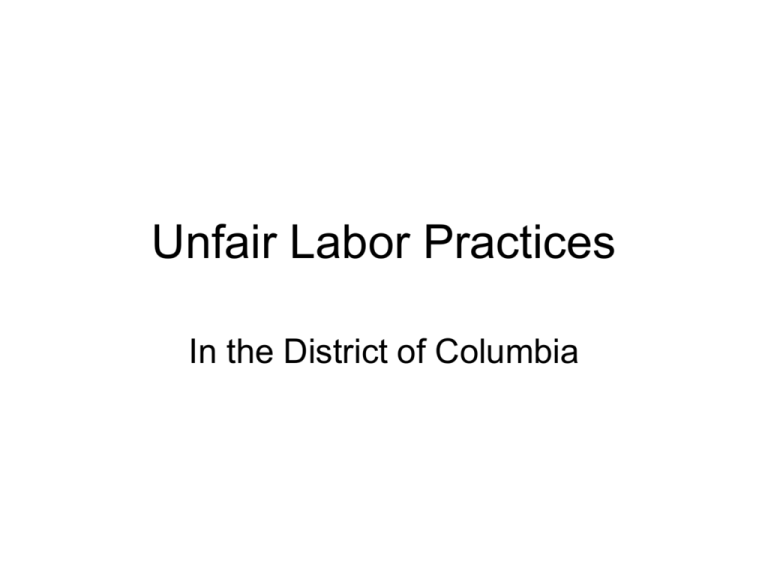
Unfair Labor Practices In the District of Columbia Introduction • The Public Employee Relations Board (PERB) deals with Unfair Labor Practice Complaints (ULPs). • ULPs are defined by DC Code Section 1617.04. • PERB processes ULPs according to Section 520 of its regulations. DC Code Section 1-617.04 • Defines an Unfair Labor Practice • (a) Deals with what District officials and managers may not do. • (b) Addresses what unions and other District employees may not do. DC Code Section 1-617.04(a) • The District, and its agencies may not: • Interfere with or coerce an employee when they are organizing, joining or participating in a labor union. – Examples: organizing new members, serving as an officer, attending meetings, campaigning for office. DC Code Section 1-617.04(a) • Control or assist in the formation, existence or administration of any labor union. (except official time) – Examples: Lending staff, paying bills, nominating officers. DC Code Section 1-617.04(a) • Discriminate in hiring or employment to encourage or discourage membership in any labor union. (except for managers) • Retaliate against an employee because he or she has participated in the labor relations process in any way. – Examples: grievances, affidavits, testimony, negotiation • Refuse to collectively bargain in good faith. DC Code Section 1-617.04(b) Other employees, labor organizations, and their officers may not: • Interfere with an employee when they are organizing, joining or participating in a labor union, or with any District official when they are asserting their rights. – Examples: Rights under the Contract, Right to assign work, Right to set schedules. DC Code Section 1-617.04(b) • Try to get the District to violate an employee’s rights to form, join, or organize a union or to refuse to participate in the union. – Examples: running for union office, refusing to cooperate with union officials. DC Code Section 1-617.04(b) • Refuse to collectively bargain in good faith after being recognized as an exclusive representative. • Strike, conduct a work slowdown, or deny service either to the employer agency or another DC agency, or fail to try to prevent these actions. Bringing a ULP to PERB If your agency has committed an Unfair Labor Practice. •Frame the issues by writing a detailed statement of what happened and why you think it is a ULP. •Section 520.3 of the PERB regulations tells you what must go into a complaint. The ULP Complaint PERB Regulations require: • Contact information for all parties and NAGE’s representative. • A detailed statement of the facts with references to the code sections violated. The ULP Complaint PERB Regulations require: • A statement of relief you want. • Whether there are any related grievances or other cases. • Your collective bargaining agreement. Next Steps • Inform the NAGE DC office. • We will work with you to file the complaint with the PERB. • You have 120 days to file a complaint. After Filing Your ULP • PERB will conduct an investigation. • PERB may hold a hearing if there are factual disputes. • The hearing examiner will issue a recommended decision for the PERB to consider. • The parties may file exceptions to the recommendations with the PERB. • PERB issues its ruling (Decision and Order). Is this an Unfair Labor Practice? On the morning of Monday, August 8, 2011, when you get to work management announces it will make major changes to unit members work schedules that coming Friday. They tell you the agency head has determined this is necessary, but won’t say why the change is necessary. Is this an Unfair Labor Practice? You send management a demand to bargain that same day. You also make an information request asking why the change is being made, how notice will be given to employees, and other questions about implementing the change. Management contacts you and sets a date and time to bargain, but refuses to provide any further information. Is this an Unfair Labor Practice? Ms. Bentley, your new local VP, meets with management on Tuesday, August 9. The meeting takes place during work hours. Ms. Bentley meets with the agency’s chief labor relations person and his assistant. They agree on a number of procedures for implementing the new policy. They also agree to hold a follow-up meeting on Wednesday. Is this an Unfair Labor Practice? The second meeting never takes place when labor relations calls and cancels it a couple of hours before it is scheduled. Ms. Bentley tries to reschedule the meeting but managers will not return her calls. Is this an Unfair Labor Practice? On Friday August 12, management implements the new shifts. Due to bad planning and lack of notice, four employees fail to show up at the proper times for their shifts. Is this an Unfair Labor Practice? Management charges these employees AWOL. Problems continue, and seven other employees also miss their shifts and are charged AWOL over the next few days. Is this an Unfair Labor Practice? Ms. Bentley files a grievance challenging the AWOLs on Monday, August 15. Ms. Bentley also delivers a grievance challenging the shift change at the same time. A couple of days later Ms. Bentley’s supervisor informs her that the agency head is very upset that the union has filed grievances about the AWOL charges and shift changes. Is this an Unfair Labor Practice? He also tells Ms. Bentley that her request for official time to attend the negotiating session has been denied. Management has never denied an official time request for meetings before. He says that he is going to have to charge her AWOL for the time she was away at the meeting For discussion • Do any of the agency’s actions constitute an unfair labor practice? • Which ones and why? • Break out by locals to discuss.

